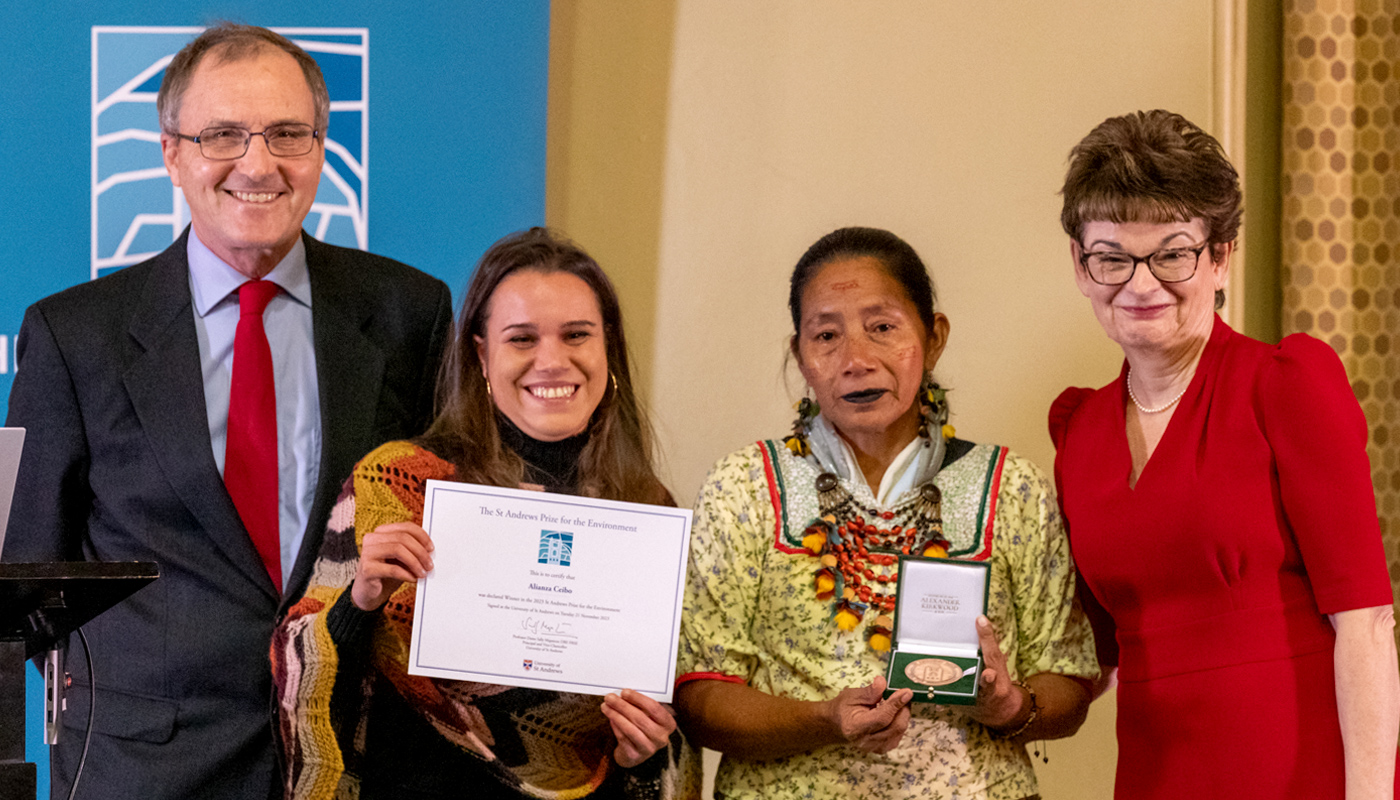Alianza Ceibo announced as winners of the 2023 St Andrews Prize for the Environment
 A non-profit alliance of Indigenous nationalities has won the US$100,000 St Andrews Prize for the Environment for their efforts to conserve rainforests. They were presented with the prize in a ceremony held at the University of St Andrews on Tuesday 21 November.
A non-profit alliance of Indigenous nationalities has won the US$100,000 St Andrews Prize for the Environment for their efforts to conserve rainforests. They were presented with the prize in a ceremony held at the University of St Andrews on Tuesday 21 November.
Alianza Ceibo consists of four Indigenous nationalities of the Upper Amazon of Ecuador, Colombia and Peru – Ai’ Kofán, Siekopai, Siona, and Waorani – who empower their communities to conserve their rainforest territories, keep their cultures alive, and make their own decisions over their lands and lives.
BleagLee, a Cameroon-based company fighting climate change by using drone-based remote sensing and satellite imagery to combat open waste burning and poor waste disposal, and Circular Ocean, a social and environmental impact organisation based in Peniche, Portugal, working with the coastal community to combat marine litter by tackling the unsustainable disposal of fishing nets, were named runners-up and each receives US$25,000.
Alianza Ceibo co-founder Alicia Salazar was visibly emotional when accepting the Prize, acknowledging the significant impact the Prize money will have on strengthening the group’s organisational capacity, allowing them to expand their work of preserving the jungle.
“We extend our sincere gratitude to the University of St Andrews for awarding us with this invaluable Prize, a crucial support for the tireless efforts of Alianza Ceibo. This award pays tribute to the unwavering commitment of all those Indigenous communities across the Amazon who daily and courageously risk their lives to advance the crucial mission of protecting one of the last and most vital carbon sinks on Earth.
“In a global context where we, as Indigenous peoples, receive less than 1% of all climate funding, this prize serves as a beacon, emphasizing the critical need for recognising and supporting Indigenous climate action. We appreciate the University’s acknowledgment of our vital role as guardians of the Amazon, advocates for the climate and, ultimately, stewards of life itself.
“Beyond fortifying our determination, this award has the potential to create a snowball effect, amplifying the visibility of our struggle and providing a powerful platform to inspire other peoples and communities to join this essential cause. It stands as a potent tool to scale our efforts for the preservation of our environment and the wellbeing of future generations.”
The judging panel consisted of Professor Sir Ian Boyd, Chair of the St Andrews Prize for the Environment Judges, Bishop Wardlaw Professor of Biology at the University of St Andrews, and President of the Royal Society of Biology; Dr Jesse Ausubel, Director of the Program for the Human Environment and Senior Research Associate at the Rockefeller University; Professor Ineke De Moortel, Master of the United College and Professor of Applied Mathematics at St Andrews; Dr Axel Moehrenschlager, Chair of the IUCN SSC Conservation Translocation Specialist Group; and Professor Camilla Toulmin FRSE, Senior Associate, Climate Change, International Institute for Environment and Development, and Professor in Practice, Lancaster Environment Centre, Lancaster University.
Professor Sir Ian Boyd noted: “We received over 180 entries for the year’s Prize, from 50 countries and five continents. We were incredibly impressed by the quality of the projects, and the three finalists were fantastic. We were particularly impressed by Alianza Ceibo’s capacity to engage with the local communities and the Indigenous populations.”
Now in its 25th year, the St Andrews Prize for the Environment is a major international competition led by the University of St Andrews that recognises innovative responses to the most pressing environmental issues of our day. Since its inception in 1998, the Prize has awarded more than US$2.5million in funding to organisations whose work is crucial in addressing the climate crisis, protecting the environment, and encouraging a more sustainable society.
Issued by the University of St Andrews Communications Office.